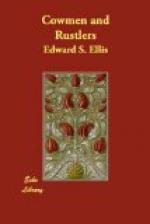“Yes,” he replied, “I cannot deny the truth of what you say, Fred. I ought to leave this part of the country.”
“Of course; you’re not needed; your future has been mapped for you, and it is hard to make up lost time.”
“We found that out at the high school,” returned Mont, with a light laugh; “but the pearl of great price, in a worldly sense, is good health, and I have been repaid in securing it.”
“And having secured it, it remains—Mont,” added his companion abruptly, but without the slightest change of tone, “don’t stop to ask me why, but step quickly through the door and into the house, and keep out of sight for a few minutes.”
“I understand,” said Sterry, obeying without an instant’s hesitation.
The prompt, unquestioning compliance with the request of Fred Whitney showed that Monteith Sterry understood the reason that it was made of him.
The truth was, that during the last few minutes the young men were talking in front of the house, each descried something suspicious on the broad plain. They instinctively lowered their voices, and though neither made reference to it, both gave more attention to it than to their own words.
They heard nothing of the tramp of horses, but saw the shadowy figures of several men hovering on what may be termed the line of invisibility. Sometimes they were distinguished quite clearly, and then seemed to vanish; but the youths could not be mistaken.
A number of persons were out there, not mounted, but on foot, and moving about, without approaching any closer, for the space of several minutes. It looked as if they were reconnoitering the house from a distance and debating the best manner of procedure.
The suspicions of the friends were the same. They were rustlers looking for the inspector.
Mont Sterry would have preferred to stay where he was and have it out with them, but the circumstances were so peculiar that he could not refuse to do as his comrade requested.
The cause of Whitney’s wish was the abrupt increasing distinctness of the figures, proof that they had reached a decision and were approaching the house.
They speedily came into plain sight, four men, in the garb of cowmen, and they were rustlers beyond question.
Conscious that they were seen, they now advanced directly, as if coming from a distance, though the fact that they were on foot showed that such was not the case.
With feelings which it would be hard to describe, Fred Whitney recognized the first as Larch Cadmus, wearing the same whiskers as before. Had he been thoughtful enough to disguise his voice the young man would not have suspected his identity.
The moon had worked around into that quarter of the heavens that its light shone on the figure of Fred, who rose to his feet, as was his custom, and advanced a few paces to meet the newcomers.
“Good evening!” he said. “How happens it that you are afoot at this time of night?”




